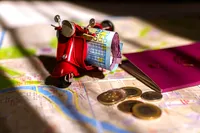Currency in Brazil
What Currency Does Brazil Use Now

Brazil, a vibrant country in South America, is renowned for its captivating culture, breathtaking landscapes, legendary football, and of course, the iconic Rio Carnival. Like every other country, Brazil too has its own financial system and currency. Currently, Brazil uses the Brazilian Real, symbolized as R$ and is named after the Portuguese word for "royal." Known for their durable polymer-based material, the banknotes come in denominations of R$ 2, R$ 5, R$ 10, R$ 20, R$ 50, and R$ 100, and the coins vary from 1 cent to R$ 1 real.
Credit and Debit Cards in Brazil
Towards the pursuit of a cashless society, Brazil has made great strides. Credit and Debit cards are now pervasive across the country and are commonly accepted in most establishments, from large shopping malls and sit-down restaurants to small street vendors and taxi drivers. The most widely used cards are Visa, MasterCard, and American Express.
That said, while traveling in Brazil, it’s always wise to inform your bank beforehand, as sudden overseas card activity may trigger fraud warnings causing unnecessary inconvenience. It's also recommended to have a chip-and-pin card as Brazilians use this system, making it a more accepted and secure option.
Using Cash in Brazil

Despite the rise of cashless transactions, using cash is still prevalent and sometimes necessary, particularly in rural areas and small towns. Therefore, keeping some amount in Brazilian Real might be prudent for those unwelcomed occasions when card machines are faulty, or vendors only accept cash.
The local 'Casas de Câmbio,' or exchange houses, usually offer better rates than most airports or hotels. Nonetheless, do compare rates as they can vary. Importantly, keep an eye on your cash as, like any other country, pickpockets can turn your amazing holiday into a nightmare.
ATMs in Brazil

ATMs, locally known as 'Caixas Eletrônicos,' are widespread across Brazil. You can find them in banks, supermarkets and shopping centers. Most machines are multi-functional, offering options for cash withdrawal, transferences, bill payments, and prepaid mobile top-ups.
However, keep in mind that foreign cards might not be accepted at all ATMs, with Banco do Brasil, CitiBank, and HSBC being the most welcoming. Also, for better security, banks limit ATM transactions to daylight hours, typically from 6.00 a.m to 10.00 p.m.
Bank Hours
Brazilian banking hours are quite different from many Western countries. Most banks operate from Monday to Friday, opening at 10:00 a.m. and closing at 4:00 p.m. It's important to note that banks here do not operate during weekends and national holidays.
Also, remember that the hours leading up to the opening and closing time tend to be the busiest, so if you want to avoid long queues, plan your visit around mid-day. While these office hours might seem limited, the digital banking capabilities in Brazil are advanced, enabling most banking jobs to be done online.
Whether you're planning a trip to Brazil or thinking about relocating, understanding its financial landscape will certainly assist in making your journey smooth and hassle-free. With cash, cards, and ATMs all readily available, managing money in Brazil is quite straightforward.
